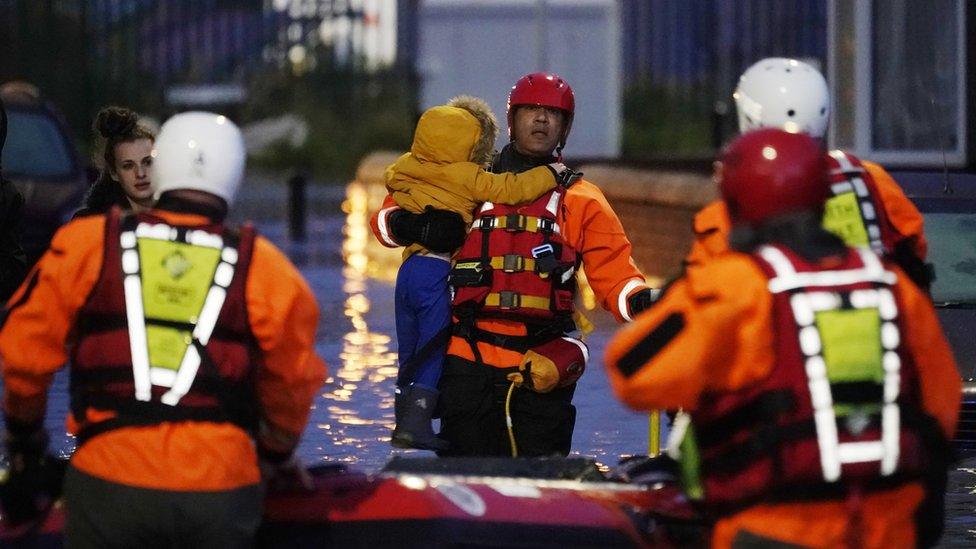General election 2019: Have flood and fire services been cut by the Conservatives?
- Published

South Yorkshire Fire and Rescue Service carry a child through floods in Doncaster on Friday, 8 November
Extensive, fatal flooding has put the rescue services in the spotlight of the election campaign.
A press release from the Labour Party on Monday, external night made a series of claims about the cuts to funding for the Environment Agency and front-line fire-and-rescue services (who are helping with the relief effort after the floods).
Speaking in Blackpool on Tuesday morning, Labour leader Jeremy Corbyn said the response to the flooding "would have been a different story" if it had happened "in Surrey instead of Yorkshire".
"Under the Tories, front-line flood response and Environment Agency staff have been slashed by a fifth, and our fire-and-rescue service by nearly a quarter," he said.
Do the numbers add up?
Claim: There has been a 20% cut in staff numbers at the Environment Agency under the Conservatives
Asked by Reality Check where the 20% figure had come from, Labour identified an article from Unearthed, external, a journalism project run by Greenpeace.
According to Unearthed, there were 13,027 staff employed by the Environment Agency in January 2013 and this figure fell to 10,533 by January 2018. That would be a fall of 19.1% - or just under a fifth.
And the figures match up with workforce data, external held by the Department for Environment, Food and Rural Affairs.
The starting point of the data, January 2013, is three years into the Conservatives' period in power (with its then Lib Dem coalition partners), rather than the start of its administration.
The very latest figures, for September this year, show staff numbers have risen very slightly since January 2018, to 10,713 - but that's still well below the January 2013 figure.
Claim: The Conservatives have cut fire-and-rescue services by more than £300m, losing 23% of their front-line staff.
There is some data to support this.
Funding for fire services comes from both the central government budget and from local council tax levies.
Public-spending records from the Treasury, external show in the year 2009-10, which ended a little more than a month before David Cameron became the Conservative prime minister, £3.118bn was spent on "fire-protection services".
The same figure in the 2018-19, external year was £2.739bn. The difference is £379m – tallying with Labour's claim of more than £300m having been cut.
When it comes to staffing, Labour has not defined what it considers "front-line staff" - but again, there is data to support its claim of a 23% cut.
The total number of firefighters in England, external - these numbers do not include the rest of the UK - fell from 41,632 in 2010 to 32,233 in 2019. That's a difference of 9,399, or 22.6%.

Claim: Firefighter numbers have fallen in South Yorkshire by 25%, West Yorkshire by 36%, Derbyshire by 11%, and Nottinghamshire by 23%.
Mr Corbyn was keen to show the flood-hit areas in the north of England had suffered from cuts to fire-and-rescue services.
Using the same way of counting staff - full-time-equivalent total firefighters - these numbers are accurate:
South Yorkshire saw its numbers fall from 872 to 653 (25.1%)
West Yorkshire went from 1,609 to 1,027 (36.2%)
Derbyshire's firefighters went from 633 to 562 (11.2%)
Nottinghamshire fell from 762 to 590 (22.6%)
But there have also been cuts in other parts of the country. Surrey saw its comparable number of full-time equivalent firefighters drop from 725 in 2010 to 542 in 2019 - a fall of 25.2%.
What do the Conservatives say?
Speaking to the BBC's Politics Live programme on Tuesday, Conservative Helen Whately said the claim flooding would be treated differently in the South was unfair, pointing to the prime minister convening a Cobra meeting - or emergency committee.
She said: "£2.6bn has been spent on projects to improve flood defences - it's been the number-one priority of the environment agency for the last few years.
"It's been taken very, very seriously."
The £2.6bn is the amount the Environment Agency is planning, external to have spent on capital projects between April 2015 and March 2021. It aims to protect 300,000 homes.


